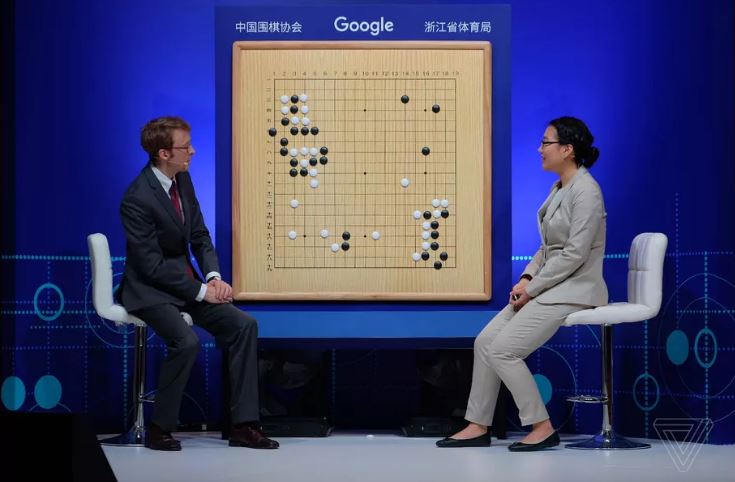Go master defeated by Google software, mocked by silver spoon boy
A summary of the top news in Chinese society and culture for May 23, 2017. Part of the daily The China Project news roundup "Does India have more people than China?"

Ke Jie 柯洁 is a 19-year-old from Lishui in Zhejiang Province. He is also the world’s best player of the ancient Chinese board game Go (围棋 wéiqí), per an algorithmic ranking of historical performances by computer scientist Rémi Coulom. On May 22, Ke lost the first game of a three-part match this week against Google’s Go-playing machine, AlphaGo. Ke was defeated by a narrow margin of half a point. According to The Verge, the software “doesn’t appear to care about the margin of victory, instead choosing moves that it has determined are the most likely to lead to a win.”
AlphaGo first enjoyed the limelight when it trounced the Korean 18-time world champion Lee Sedol four games to one in March 2016, which makes it the first machine to beat a professional human Go player. Although Ke initially declined to have a one-on-one match against AlphaGo after its victory against Lee, the young player nevertheless boasted (in Chinese) on his Weibo account that “AlphaGo may defeat Lee, but it can’t beat me.” In a press conference after his first encounter with his machine rival, Ke explained his defeat by saying that “AlphaGo is improving too fast” and seemed “like a different player this year.”
One reaction to Ke’s loss came from Wang Sicong 王思聪, son of billionaire Dalian Wanda Group founder Wang Jianlin 王健林, who wrote: “After your boasting when Lee lost to AlphaGo, where has your cockiness gone now?” The comment has since been deleted from Wang’s Weibo account, but has been widely copied (in Chinese) and roundly condemned by Chinese internet users. Wang’s antics are a regular subject of derision: In 2015, he posted photos of his dog wearing two gold Apple iWatches, enraging many commenters on social media.
The contest was held in Wuzhen, Zhejiang Province, as part of the Future of Go Summit co-sponsored by the Chinese Go Association and Google. The other two games will take place on May 25 and 27. But Chinese Go fans are unable to watch the tournament amid the long-lasting rift between the Chinese government and Google. Three journalists told Quartz that higher authorities had ordered them not to broadcast the match live or even mention Google’s name in their reporting of the event.
- ‘Proud of China’ campaign begins at University of Maryland after controversial commencement speech / People’s Daily
Yesterday, we noted the social media firestorm caused by a video of a Chinese student’s speech at her graduation ceremony at the University of Maryland in which she contrasts the fresh air and freedom of expression she has enjoyed in America with the lack of those things in China. The reaction has continued, with the People’s Daily reporting — in English (linked above) but not in Chinese — on a group of Chinese students at the university who have made a video about being proud of China. You can watch the video on YouTube. - Beijing’s property crackdown puts owners in limbo / Caixin
“Desperate to get on the housing ladder, Pang Fei shelled out more than 1.1 million yuan ($160,000) last year for a 38-square-meter (409-square-feet) loft apartment under construction on the outskirts of Beijing” that was classified for commercial use and in a legal gray area. The city’s tightened real estate regulations, intended to stop the market from overheating, mean that people like Pang have little hope of being able to sell their apartments. - China’s drug addicts call for divine intervention / Sixth Tone
- ‘Dangal’ becomes China’s biggest non-Hollywood foreign film / Bloomberg
- Chinese star claims she wore national flag dress at Cannes to show support for Belt and Road / Shanghaiist
- China’s wild geese are dying because they’re too well-behaved for their own good / The Verge
- Chinese Journeys: A special issue on new Chinese writing featuring poetry, prose, translations and commentary / Stand
- Chinese merchants thrive in Senegal, where people ‘needed stuff’ / NYT (paywall)






